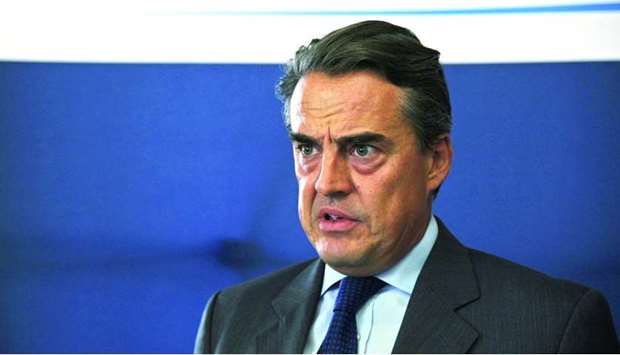"The future of aviation is positive. People want to fly. We expect 7.2bn passengers to travel in 2035, a near doubling of the 3.8bn air travelers in 2016. And if trade liberalisation gathers pace, demand could triple the 2015 level," De Juniac said.
The IATA chief said aviation is a major player in global economy as it contributes $2.7trn, equivalent to 3.5% of world gross domestic product (GDP), while also supporting 62.7mn jobs globally.
On the major challenges of safety, security and sustainability, De Juniac said that when it comes to safety, IATA's strategy reflects the importance of global standards.
"The flagship is the IATA Operational Safety Audit (IOSA). It is the global standard or global best practice for operational safety. Every IATA airline must be on the IOSA registry. And even our non-members are using IOSA," he said.
"We also face a growing vulnerability on security. Flying is secure but there are risks and challenges insider threats, landside exposure at airports, overflight of conflict zones, and cyber security. Efficient airport checkpoints are important. And our Smart Security programme is a risk-based approach that will make airport checkpoints more effective, efficient and convenient. But that alone is not enough to stay a step ahead of those who would do us harm," the IATA director general told Qatar Sky magazine.
He added that sustainability "is a difficult one for a carbon-intensive industry that is growing to meet demand," noting that governments attending the 39th ICAO assembly in October have agreed to a Carbon Offset and Reduction Scheme for International Aviation (CORSIA).
"Aviation is committed to carbon-neutral growth from 2020. And by 2050 we want to cut net emissions to half of 2005 levels. CORSIA is a ground-breaking historical achievement that is critical to meeting our carbon neutral growth target. IATA is fully supporting ICAO, governments and airlines to iron out the details so that it will be implemented successfully," he said.
Asked about the future of air transport in the Middle East, De Juniac said aviation supports 2.4mn jobs and nearly $160bn in economic activity. "That's an impressive number. Over the next two decades we expect traffic in (and to) the region to grow by an average of 4.6% annually. That's faster than the global average of 3.5%."
"However there are a number of issues that continue to plague the Middle East that need to be addressed. At the top of the list is infrastructure. In general, the airport infrastructure in Mena demonstrates the foresight of governments wanting to capture aviation’s economic and social benefits. But to retain their competitive advantage, continuous consultation is needed so that capital expenditure aligns industry growth, required service levels and acceptable costs.
"Even more urgent is the need to modernise air traffic management in the Gulf. A recent study calculates average delays in the Gulf at 29 minutes with the potential to double by 2025. More expensive technology is not the solution. Regional co-operation is.
"The next issue is an unprecedented rise in taxes and charges across the region about $700mn in extra costs over 2015," the IATA director general said.
De Juniac said that having a driving down the cost of structure is a "key component of the region's success," especially in the Gulf.
"I am, however, very optimistic about aviation in the Middle East. You have governments that understand the value of aviation indeed they have built it into their national economic strategies," he said.

Alexandre de Juniac
Despite the challenges facing the aviation industry, its future will be "promising" and its growth rate in the Middle East will be the highest and fastest in the world, Alexandre de Juniac, director general and CEO of International Air Transport Association (IATA), said in an interview with Qatar Sky magazine.
